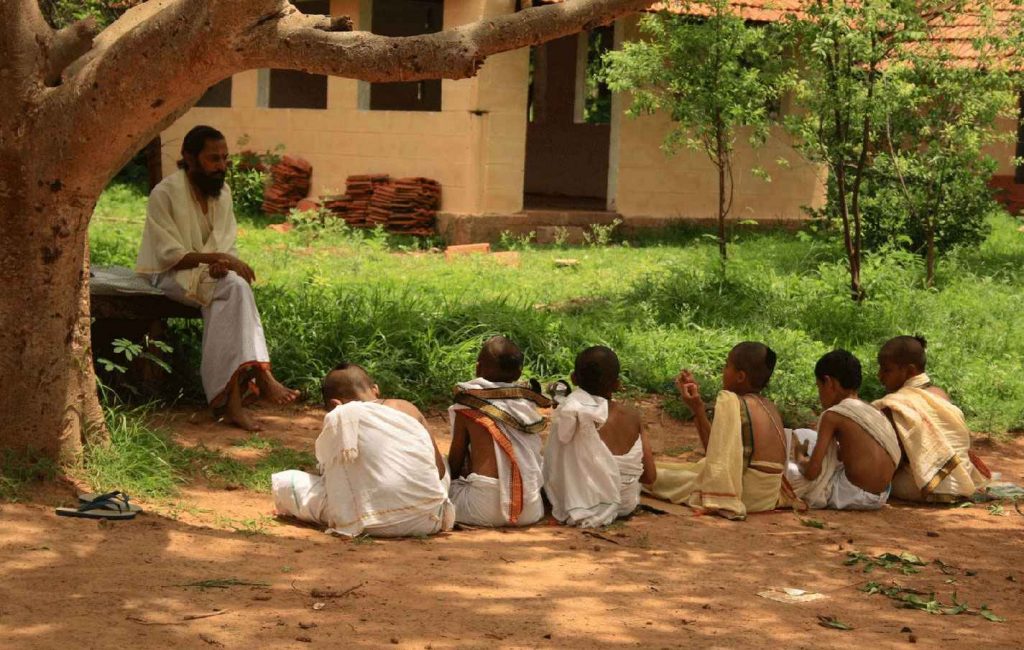A new board of education — Bhartiya Shiksha Board (BSB) — is on its way to realization with the governing council of Maharshi Sandipani Rashtriya Vedavidya Pratishthan (MSRVP) giving its in-principle approval for the setting up of the Board. The MSRVP is a fully-funded autonomous body under the Ministry of Human Resource Development. The MSRVP’s governing council has also been asked to prepare bylaws for BSB in a week. What the coming of the board would do is to standardize Vedic education and give the Board powers to draft syllabus, conduct examinations and issue certificates. Schools would evolve wherein a blend of Vedic and modern education will be imparted. But while Vedas and Sanskrit would be major subjects, modern subjects would be minor.
The move is definitely beneficial for institutions such as Vidya Bharati schools run by the RSS and gurukuls run by the Arya Samaj as they will be able to sustain their model of education up to Class XII, which is currently not permitted under boards such as the CBSE. Education is definitely a field where changes should be constantly made to keep pace with time. However, all changes should be made with the chief stakeholders, that is, students, in mind. Vedic education may have its positive benefits, no doubt. Sanskrit may have great qualities as many consider it is as an ancient language. However, the legitimisation of a board in the name of Vedic education is bound to give rise to demands for more such boards that could cater to the political necessities of different parties and will play the role of cadre factories. The problem with that would be that impressionable minds would be misused for narrow ends under the pretext of learning. Any education system that is initiated in a pluralistic country should be agnostic of dominance of a particular religion or way or life. Although it may be argued that there would be no compulsion that a parent should enrol his or her child in a school that follows BSB, in the absence of adequate number of schools for the population, it would be impossible to keep children away from such institutions even if parents were not interested in enrolling children in such schools. Another vital aspect is whether other private boards that are waiting in the wings will be willing to accept the legitimisation of one more board that is distinctly ‘brahministic’ and ‘Hindutva-based’.
Against the backdrop of glorification of half-truths and spin-doctoring of lore, it needs to be seen whether it would be beneficial for the country to give space for a Board of education with a specific objective of imparting knowledge in a never changing format. There is no doubt that numerous influencers are working across different media to build popular opinion in favour of such institutions. However, the sanctity of their ideals comes into question when the education imparted in schools have been found to distort history and shutting children off certain so called ‘unsavoury’ parts of the past.
A Board that can turn the clock back to where it should no longer be going will do great disservice to education and the coming generations. It should also be seen how effectively existing systems of Vedic education have helped the students they produce in becoming better humans. The legitimisation of any new Board of education in the country should happen only after thorough studies agnostic of party ideologies. Coming generations should not be pushed into the Dark Ages in the name of faux-nationalism, as Hindutva can never be considered synonymous with love for the country.
While our old scriptures do hold immense wealth of knowledge, much too many misinterpretations have crept in that do not permit a holistic education system to be based on them. It is a known and accepted fact that Hindoo scriptures flowed down from generation to generation by word of mouth only. Unfortunately, it was the ‘upper castes’, the privileged class, which managed to keep a stranglehold on this wealth of ancient knowledge. Especially since scripts and the ability to write came through a delayed process to this subcontinent, the veracity, uniqueness and also purity of our Vedic scriptures is highly questionable. While Egyptians and the Chinese, even by means of hieroglyphics, did manage to retain their earliest experiences and wisdom, our dependence on foreigners such as the Moslem and European scribes may not be overlooked. We could, of course, blame them now for not comprehending our thought processes but perversions galore got entwined because of rigid class differences that thwarted any effort of consolidating society at large. Any fragmented knowledge can never be considered containing the complete truth.
